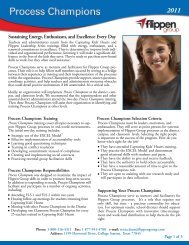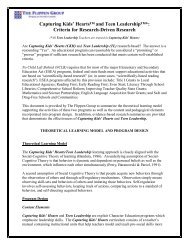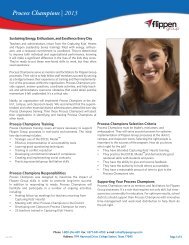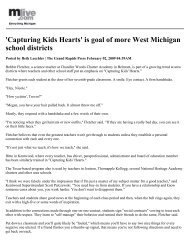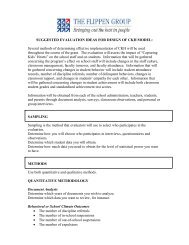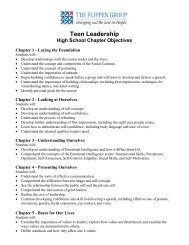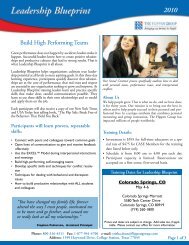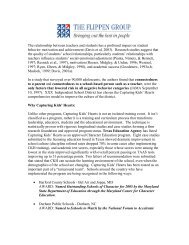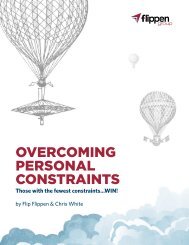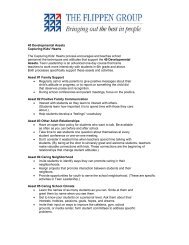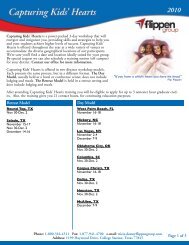Smart & Good High Schools - The Flippen Group
Smart & Good High Schools - The Flippen Group
Smart & Good High Schools - The Flippen Group
- No tags were found...
You also want an ePaper? Increase the reach of your titles
YUMPU automatically turns print PDFs into web optimized ePapers that Google loves.
CHAPTER 5: Fostering the 8 Strengths of Character—Outcome 3OUTCOME 3:Socially and Emotionally Skilled PersonPromising Practice 2:Foster positive peer relations.3In addition to caring relationships withadults, adolescents need caring relationshipswith each other. Positive peer relations providemany opportunities to develop and practice social andemotional skills (see box on page 119). Teachers andschools can take steps that increase the likelihood thatevery student will enjoy such relationships in school.◆ <strong>The</strong> 2-minute interview. Said one teacher: “My studentscome from diverse backgrounds and neighborhoods. It’snot uncommon for a student to know only two other studentsin a class of 35.” To help students get to know eachother, he uses the first four minutes of every class duringthe first two weeks of school to have students do paired 2-minute interviews. <strong>The</strong>y each have two minutes to asktheir partner five questions and to record the answers.1. Where do you live?2. What’s an achievement you’re proud of?3. What is a special interest you have?4. What’s a goal you’re working on?5. Who is a hero for you?This teacher comments: “We continue this until every studenthas interviewed every other student in the class. <strong>The</strong>first test of the year asks them to list the names of everyoneelse in the class.”◆ A class mission statement. <strong>The</strong> same teacher who doesthe 2-minute interviews explained how he involves studentsin developing a class mission statement. He leadsinto that by asking, on the first day of school, “What arethe characteristics of a caring community?” He and thestudents generate a list on the board that remains in thefront of the room. <strong>The</strong>n for homework, he asks them tobring in mission statements from the companies theirparents work for.On Day 2, they look at the different examples and discusswhat a mission statement is and how it defines and drivesan organization. He says:<strong>The</strong>n I have them work in groups of six to develop a missionstatement for our class. It can’t be more than two sentences.After the groups post their proposed mission statements,we discuss them and combine them into one. Wewrite it in large letters and post it in the front of the room.Two of my favorites:• THIS IS A GOLDEN RULE CLASSROOM—WE PRACTICE WHAT WE PREACH.• THIS IS A POSITIVE STROKES CLASSROOM—THE MORE YOU GIVE, THE MORE YOU GET.One teacher asks his students todevelop a class mission statement.◆ A community-building activity at the start of class. Manyteachers find that a short community-building activity atthe beginning of class renews the sense of solidarity, createsa positive attitude toward subsequent academic work,and gives students interactive experiences that developtheir relationship skills.One teacher begins class with what he calls his Daily Four.He starts by asking, “What are we celebrating today?” 15Students can then choose one of four ways to contribute:1. Share good news.2. Tell about someone or something you’re grateful for.3. Affirm someone in the class.4. Make us laugh (joke must be clean).This opening ritual takes about five minutes. <strong>The</strong> teachercomments: “<strong>The</strong>re’s always more energy in the room afterwe do this. And because of the trust and comfort levelcreated, students are more willing during the rest of theperiod to risk offering their viewpoint in a discussion.”◆ Advisories. When they are conducted well, advisoriescan benefit both performance character and moral character,including the development of social and emotionalskills. A boy on our Student Leaders Panel said: “Youlearn to use your advisor as a mentor, someone you cantalk with when you have a problem and who helps you setgoals and improve as a student. Advisory also enables youto get to know and appreciate other students you wouldn’tnormally meet or associate with.”Whatever job you are asked to do, do agood one—because your reputation isyour resumé.—MADELEINE ALBRIGHT120<strong>Smart</strong> & <strong>Good</strong> <strong>High</strong> <strong>Schools</strong>



